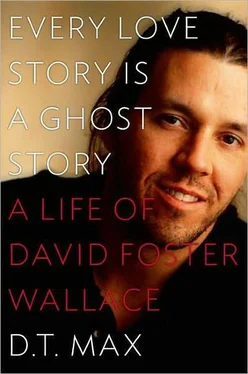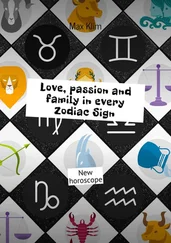It was my first hint that being a surrealist, or being a weird writer, didn’t exempt you from certain responsibilities. But in fact it obligated, it upped them…. That whatever the project of surrealism is works way better if 99.9 percent of it is absolutely real…. I mean, most of the word surrealism is realism, you know? It’s extra-realism, it’s something on top of realism. It’s that one thing in a Lynch frame that’s off, that, if everything else weren’t picture-perfect and totally structured, wouldn’t hit.
Around this time Wallace was also finishing a new short story about a guest on Late Night with David Letterman . Wallace told Costello he had gotten the idea for it from a show he’d seen several years before. The singer Billy Idol had bragged to the talk show host that his songs were so popular that dealers named street drugs after them: cocaine was “White Wedding,” Quaaludes were “Rebel Yells,” and marijuana was “Dancing with Myself.” Letterman, after a beat, responded, “You must be a very proud young man.”
This was the general inspiration; the direct source was that Wallace had watched the actress Susan Saint James on a recent Letterman show and taken extensive notes—“w/r/t [with respect to] the fact that the idea of having a television actress who’s agreed to represent Oreos face questioning by Letterman on why she would do such a thing and what the potential implications for her career might be seemed fascinating,” as Wallace would later write in response to a publishing lawyer’s inquiry when the story raised legal issues.
In the story that resulted, “My Appearance,” 25Wallace wanted again to show the way media colonized everything from history to our private thoughts. But in the Letterman story, Wallace narrowed his concern, focusing on what he saw as television’s elevation of a rising attitude of knowingness in the culture. “My Appearance,” set, like Broom, slightly in the future, begins with a straightforward statement of fact: “I am a woman who appeared in public on Late Night with David Letterman on March 22, 1989.” The story then goes on to recount how her media-savvy husband, Rudy, and his friend Ron prepare the actress for a segment in front of the talk show star. At first the actress resists the idea that to be on Letterman is any different than, say, to be on the talk show hosted by Johnny Carson. “I don’t see this dark fearful thing you seem to see in David Letterman,” she objects. Her handlers patiently explain that their coaching is about more than Letterman; it’s about understanding that the definition of what is admirable or acceptable behavior has changed. We no longer esteem those who know or care; we esteem those who affect not to know or care. There is no arguing with this cultural change, of which Letterman is just a symptom.
“Act as if you knew from birth that everything is clichéd and hyped and empty and absurd,” Ron says, “and that that’s just where the fun is.”
“But that’s not the way I am at all.”
The cat yawned.
“That’s not even the way I act when I’m acting,” I said.
“Yes, Ron said, leaning toward me and pouring a very small splash of liquor on my glass’s ice cubes, furred with frozen cola.
Ron and Rudy continue to talk, explaining that irony has become the language of the elite. “I think being seen as being aware is the big thing, here,” the actress’s husband stresses. The actress goes on the show, mocks herself lightly, and succeeds with her host — the fictional Letterman pronounces it “grotesquely nice to have her on”—but she feels somehow depleted afterward. This isn’t, after all, the way she is.
Wallace had already proposed to follow Broom with a collection of stories. Howard, after some hesitation — story collections didn’t sell as well as novels — came around to the idea and paid an advance of $25,000. This was great news to Wallace, confirmation that Broom had done what it had to — made him a writer with a publisher and a career. The new book, tentatively titled Long and Short of It , would give him, he wrote Nadell with delight in April 1987, a chance to “try…to fuck a bit with the fiction current on the scene.”
But if he was going to publish Wallace’s stories as a book, Howard said, he needed someone else to publish some of them first; Wallace had no reputation as a short story writer and he had had very little success with magazines so far. This had not been for lack of trying. “I am working on a lot of short fiction, and actually have a few stories together that I think are pretty good,” he had written to Dale Peterson the year before. He had asked Nadell to start sending them out: “I think they’re good — though somewhat off the beaten path.” He saw them for Esquire, the Atlantic, and the New Yorker . Nadell gently suggested that such mainstream publications would find them too avant-garde. The dominant genre in these magazines remained realism and minimalism — taut stories with bald denouements. That was not what Wallace was offering. Even Nadell found some of Wallace’s stories hard to like. “Not a nice noise, Bonnie,” he wrote after she had an unflattering reaction to “John Billy.” Nadell’s instincts were right. Playboy found the Letterman story “too smart for its own good.” The Atlantic wanted it cut down, as did Esquire , which turned down “Luckily the Account Executive” too. Said the Atlantic editor, “Wallace clearly is the talent Mary Carter has insisted he is,” but “Little Expressionless Animals” was “too long, too idiosyncratic, and too loosely constructed for our purposes.”
Wallace minded these dismissals less than one might have expected. The vagaries of magazine publishing barely touched his sense of what he should be doing. Instead he saw submitting stories as sort of a game, publishing-tennis, and offered to take over from Nadell when it was time to approach smaller magazines. He put a bulletin board on his wall where he pinned rejection notes. But in the meantime, the future was bearing down on him. He decided to try to get out of Arizona still faster. He had planned to return briefly in the fall of 1987 to finish his MFA but instead arranged to leave in May. Any leftover work could be done from home and the manuscript mailed.
But he still had no idea where he was going next. Dale Peterson continued to work on getting him a part-time job at Amherst. He thought about doing a road trip on a motorcyle à la Charlie McLagan or even going to Los Angeles to write television shows. In the meantime, he rewrote and organized his stories for his thesis committee. He was coming to the end of his complicated, unsatisfactory life at Arizona. When a presentation copy of Broom he had given one of his professors surfaced at a nearby used bookstore, he was appalled. In late spring, he left Carter’s condo, taking a print he liked from the wall with him, headed home, and set up in his old bedroom again to work. Quickly, his energy was focused on what he was writing. He was now busy with a new story that was meant to show the failings of metafiction. The story got longer and longer, Wallace’s old gigantism bursting the bounds of his newfound discipline. His new story, he wrote JT in June, now was “cruising…at a wildly disordered 150pp.” Wallace had only one certain engagement. He had applied and been accepted to Yaddo, the artists’ colony in Saratoga Springs, for late July, 26but after that, what? “Maybe to Breadloaf,” he wrote JT, “maybe to Boston, maybe to Albany, maybe to L.A. Nothing is sure in the dry burg that is this boy’s future.”
CHAPTER 4. Into the Funhouse
Читать дальше












